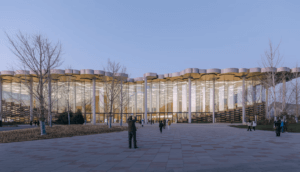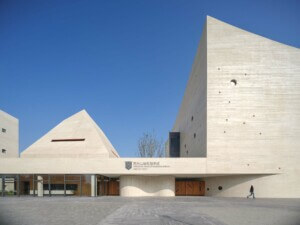A super-verdant housing development described as a “vertical forest” in Chengdu, capital of the Sichuan province in western China, has proven to be anything but alluring to the owners of the compound’s 826 apartment units, who have reportedly opted not to move into their new homes until something is done about the scourge of blood-drawing insects that have taken over the complex.
Completed in 2018, the Qiyi City Forest Garden development had sold all of its units by April of this year, according to Agence Presse-France. However, between the completion of the eight-tower complex and the occupancy phase, the vegetation-shrouded private balconies attached to each unit had become so overgrown that a mosquito infestation of epic proportions ensued. And while the disease-carrying insects are likely relishing the foliage-rich atmosphere, the infestation has prevented all but a reported ten families from taking up residence at the development, according to state media.
As the AFP explained, like with most towers blanketed with a copious amount of greenery, the vegetation at Qiyi City Forest Garden wasn’t planted for extra aesthetic oomph. The plants, composed of over 20 different species, were specifically chosen for their noise-dampening, pollution-absorbing properties. (Chengdu’s air quality is among the worst in China, although improving.) But it would seem that the plants were too voluminous and quickly grew out of control, spawning a tenant-repelling insect infestation and some serious post-apocalyptic vibes.
“Without any tenants to care for them, the eight towers have been overrun by their own plants—and invaded by mosquitoes,” wrote the AFP. “Plants have almost entirely swallowed up some neglected balconies, with branches hanging over railings all over the towers, footage shot this month showed. Paper was seen taped over some of the windows that were still visible behind the overgrown plants.”
In 2015, Civil Engineering, the magazine of the American Society of Civil Engineers, examined a report published by the Council of Tall Buildings and Urban Habitat that examined the pros—and cons—of the trend of covering towers with extensive vegetation. Using Stefano Boeri Architetti’s Bosco Verticale in Milan as an example, the report found numerous environmental benefits and a few downsides/challenges although a plague of insects never came up. The potential for green towers to act as a microhabitat for birds, bats, and insects is generally seen as a positive. But in the case of Qiyi City Forest Garden, things got too buggy, too quick.
As Laura Gatti, an Italian agronomist, botanist, and frequent collaborator with Stefano Boeri Architetti, explained in a statement provided to AN, the situation in Chengdu, in apparent absence of both a gardening strategy and a long-term vision, was both “predicable and avoidable:”
“The creation of a Vertical Forest is a complex project to which, as Doctors with a degree in Agricultural Science, we bring skills in phytopathology, entomology and phytoiatric. First of all, the success and safety of the project itself depend, in the design phase, on in-depth studies on the biological identity of the hosting geographical area. Subsequently, on the constant application of an integrated biological control strategy, aimed at maintaining the right balance between the populations of parasites and their natural predators. The challenge is clearly much more complicated in environments with reduced and unbalanced biodiversity. Situations like the one that occurred in China are predictable and avoidable also through constant dialogue with inhabitants.”
Fortunately, the upcoming mosquito forecast for Chengdu looks pleasing, which could give absentee apartment owners at the development a safe window to tame their overgrown balconies and invest in economy-size citronella candles.











